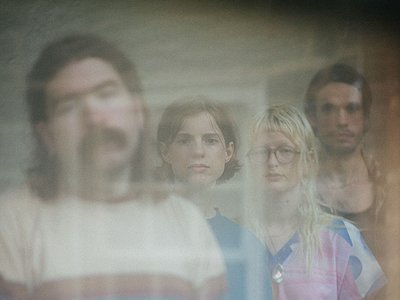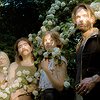Part 1
Name:Catherine Elicson
Occupation: musician
Nationality: American
Current Release: Visitor is out now on Fat Possum
Recommendations: The short film Cry When It Happens (2010) by Laida Lertxundi / Scott 4 by Scott Walker
If you enjoyed this interview with Catherine Elicson, visit the Empath website to buy and listen to music and find out about shows.
When did you start writing/producing music - and what or who were your early passions and influences? What was it about music and/or sound that drew you to it?
I was in middle school when I started my first band with some friends in my neighbourhood. So I guess I started thinking about songwriting around that time, but I mostly learned how to play music of bands I liked. It probably wasn’t until later in high school that I tried to write and record things on a computer. I got a little usb mic and would record vocals and guitar. I would burn the songs on cd or transfer them to my zune and listen to them on the way to school in the morning. My earliest influences were probably music my mom listened to, so Buddy Guy, Stevie Ray Vaughn, and other blues heads. I was definitely into emo and post-hardcore music for a period of middle school and high school. Then I got a subscription to Blender magazine and got into Ponytail and No Age and other art rock type of groups the magazine was covering. I also got into older punk and 90s music from stuff I would hear in movie soundtracks and on music TV shows, like VH1 classic programs. I think I saw music as a way to a fantasy world, which is still true. Most of my music enjoyment growing up was done in solitude, as a way to transport myself somewhere in my mind, not really a communal thing. I imagined the lives and emotions of the artists I was listening to and imagined my life being that way.
For most artists, originality is preceded by a phase of learning and, often, emulating others. What was this like for you: How would you describe your own development as an artist and the transition towards your own voice?
When I was learning guitar I spent a lot of time trying to play music of artists I liked. In the town I grew up in in Ohio I wasn’t surrounded by people writing music I was interested in. Lots of jam band energy. It wasn’t until I lived in Columbus, OH that I met people that took songwriting seriously (at least from my perspective) and wrote music that I found interesting. I felt inspired to write music that could contend with that.
How do you feel your sense of identity influences your creativity?
I’m not sure. I think in some ways identifying as a creative person or artist helps me remember to break conventions and rules in songwriting. Kind of like a fake it ’til you make it mentality. Other than that, I don’t consider identity very much.
What were your main creative challenges in the beginning and how have they changed over time?
Accepting that I’m going to write a lot of bad music before I write something I think is good. Understanding that is part of the process. I still am very hard on myself, but I try to remember that I have to keep churning out ideas until something feels right, even if that’s internally painful.
As creative goals and technical abilities change, so does the need for different tools of expression, be it instruments, software tools or recording equipment. Can you describe this path for you, starting from your first studio/first instrument? What motivated some of the choices you made in terms of instruments/tools/equipment over the years?
I have never been very interested in gear. I didn’t really try to learn about amps or guitar pedals until I was maybe 22, and I still use pretty much the same stuff now. I like having a limited amount of things to work with because I keep discovering new ways to use that equipment. I still write songs on the same acoustic guitar I got for $50 in high school. I have acquired some home recording gear and have learned to use Ableton recently. I have a Korg x50 I found in the trash, a Tascam four track a friend gave me, a Korg microsampler from eBay, and a Roland mc-505 from eBay. Sometimes I want to buy new gear but I’m overwhelmed by the possibilities. I prefer when equipment finds me and I have to figure out how to incorporate it.
Have there been technologies or instruments which have profoundly changed or even questioned the way you make music?
The Roland mc-505 was the first piece of electronic music gear that I owned. I spent a winter figuring out how to use it. I started experimenting with making different styles of music and got really into reading about the history of electronic music and disco. Attempting to write music on that machine put in me in a different headspace than writing on a guitar. With guitar I’ll play for a little bit, then stop and think for a while, then play, and on and on like that until I have a completed song. On the mc-505 the songs became formless and unending.
Collaborations can take on many forms. What role do they play in your approach and what are your preferred ways of engaging with other creatives through, for example, file sharing, jamming or just talking about ideas?
Collaborating usually begins as a conversation, getting inspired and excited about exchanging ideas. I’m the type of person that needs to see something tangible come out of the goo of inspiration, and that’s usually how bands have been formed and sustained for me. Collaborating, at least to the extent that I have to say my ideas out loud to someone else and also interpret another person’s thoughts, has always been a great source of momentum for me in a creative process.






